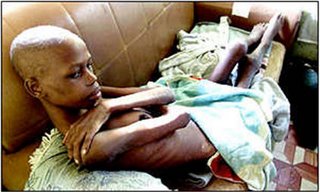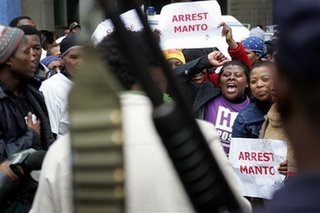The plaintive theme of the 16th International AIDS Conference concerned the increasing incidence of HIV infections amongst women. Indeed, speaker after speaker exhorted women – through commiseration, lamentations and admonitions – to assert greater control over their (sex) lives by zealously protecting themselves against contracting the virus. And they instructed women to prevent this, in part, by insisting that their husbands and lovers get tested and wear condoms – if there’s even the slightest doubt about their fidelity.
 After all, no less a person than former Microsoft Chairman Bill Gates, whose foundation recently donated $500 million to the Global Fund to Fight AIDS, lamented during the opening session (with his wife standing prominently by his side) that:
After all, no less a person than former Microsoft Chairman Bill Gates, whose foundation recently donated $500 million to the Global Fund to Fight AIDS, lamented during the opening session (with his wife standing prominently by his side) that:
We’ll never be able to deal with the numbers of people that would have to go on treatment if we don’t make a dramatic breakthrough in prevention.
For their part, researchers announced new drugs and presented new studies on prevention strategies (including “microbicides” – gels that block or kill the virus during intercourse – and male circumcision) that should help stem the HIV pandemic.
Yet virtually all of these exhortations and prevention strategies were relegated to virtual oblivion during the closing session on Friday in Toronto, Canada. Because it was dominated by the myriad ways in which speaker after speaker condemned South Africa for being, willfully, the weakest link in the global chain to stifle HIV/Aids.
Of course I appreciate that because I’ve written so many articles in support of the South African government, regular readers might expect me to come to its defense. However, I am constrained to concede that the condemnation in this case is entirely warranted. And here’s why:
An estimated 24.5 million people were living with HIV in sub-Saharan Africa at the end of 2005. Throughout this region last year, over 2 million people died from AIDS. But South Africans, citizens of the most developed country in the region, accounted for 5,500,000 of those people living with HIV and for 320,000 of those who died from AIDS.

Moreover, the primary reason this year’s conference focused on the plight of women with HIV is because they are being infected at a far greater rate than men. And the fact that women accounted for 3,100,000 of South Africans living with the virus in 2005 confirms this grave sexist trend. [Stats courtesy of avert.org]
With these morbid statistics in mind, here’s a sample of what two of the most prominent leaders in the global fight against HIV/Aids said about South Africa’s effort:
(It is helpful to know that many of these critics have long been stupefied by South African President Thabo Mbeki’s refusal to recognize that HIV causes AIDS – even though this is a universally-accepted scientific fact, and by his government’s reluctance to offer readily available HIV drugs that could have saved millions of South African lives.)
It is the only country in Africa, amongst all the countries I have traversed in the last five years, whose government is still obtuse, dilatory and negligent about rolling out treatment….It is the only country in Africa whose government continues to propound theories more worthy of a lunatic fringe than of a concerned and compassionate state. [Stephen Lewis, the U.N. special envoy on AIDS]
(The theories Lewis refers to stem from the traditional remedies South African Health Minister displayed at South Africa’s Khomanani exhibition during the conference, which involve ingesting therapeutic dosages of garlic, lemon and beetroot ruffling feathers….)
We have waited far too long to make this the crucial issue of this time….We as a world have sat back for far too long, watching South Africa continue to deteriorate in terms of thousands of people dying of HIV….Why it is that a government can continue to remain in power…despite evidence that it has abysmally failed to deliver all the essentials to its population, I do not understand. It is something that burns a hole through my heart. [Dr. Mark Wainberg, director of the McGill University AIDS Centre in Montreal and a conference organizer]
But here’s how Lewis summed up his remarks on South Africa, which drew a thunderous standing ovation from the 26,000 delegates in attendance:
The government has a lot to atone for. I’m of the opinion that they can never achieve redemption.
 Meanwhile, South African Health Minister Manto Tshabalala-Msimang was eager to explain to anyone who would give her the time of day that:
Meanwhile, South African Health Minister Manto Tshabalala-Msimang was eager to explain to anyone who would give her the time of day that:
We have engaged in the healthy lifestyle awareness campaign, encouraging people to exercise regularly and to eat nutritious and healthy food particularly vegetables and fruits and this is supported by initiatives to promote community vegetable gardens and food security….Many people are benefiting from the provision of nutritional supplementation within the Comprehensive Plan. You can see it here, it is displayed [pointing to her garlic, lemons and beetroot…].
But try as Tshabalala-Msimang might to express some regard for anti-retroviral drugs, she made it clear that she (and her government) remain unconvinced that HIV causes AIDS and that her traditional remedies (which she claims builds up the immune system) are deserving of as much respect in the global fight against this disease as western drugs.
In fact, because Tshabalala-Msimang seemed so blissfully ignorant of the prevention strategies being discussed at the conference, it fell to her spokesman Sibani Mngadi to explain what regard, if any, her government has for them. Unfortunately, Mngadi spent more time trying to convince reporters that (UN envoy) Lewis has a vendetta against South Africa than explaining why, given the alarming number of South Africans living with and dying from HIV/Aids, his government refuses to adopt the drugs protocol that have proved so effective in every other country in the world.
 Further complicating Tshabalala-Msimang’s message, however, were AIDS activists from South Africa’s Treatment Action Campaign (TAC) who staged violent protests in Cape Town against Tshabalala Msimang’s exhibition at the conference. Indeed, some of them were so ashamed and resentful of her exhibition (especially in light of the death last week of a prisoner who died from HIV/Aids, they believe, because he was denied anti-retroviral drugs) that they vowed to have her sacked, if not arrested, upon her return to South Africa.
Further complicating Tshabalala-Msimang’s message, however, were AIDS activists from South Africa’s Treatment Action Campaign (TAC) who staged violent protests in Cape Town against Tshabalala Msimang’s exhibition at the conference. Indeed, some of them were so ashamed and resentful of her exhibition (especially in light of the death last week of a prisoner who died from HIV/Aids, they believe, because he was denied anti-retroviral drugs) that they vowed to have her sacked, if not arrested, upon her return to South Africa.
 Alas, I feel constrained to draw an unfortunate parallel between the incomprehensible way President Thabo Mbeki (r) is dealing with South Africa’s AIDS crisis and the unconscionable way President Robert Mugage (l) dealt with Zimbabwe’s famine. (In part, by allowing his people to starve to death instead of distributing the genetically modified food donated by western countries, which he labeled as “poison” – even though these foods are the staple of diets in developed countries).
Alas, I feel constrained to draw an unfortunate parallel between the incomprehensible way President Thabo Mbeki (r) is dealing with South Africa’s AIDS crisis and the unconscionable way President Robert Mugage (l) dealt with Zimbabwe’s famine. (In part, by allowing his people to starve to death instead of distributing the genetically modified food donated by western countries, which he labeled as “poison” – even though these foods are the staple of diets in developed countries).
NOTE: I was extremely encouraged that Bill Gates endorsed male circumcision as one of the exciting new prevention strategies to reduce levels of HIV infection. Click here to see why.
ENDNOTE: Professional obligations prevented me from accepting an invitation to attend this conference. Therefore, I am grateful to C-SPAN2 for its extensive coverage, which allowed me to see some sessions on live broadcast and others on TiVo. Interestingly enough, in discussions with colleagues over the weekend, it became abundantly clear that I saw far more of what transpired at the conference than they did….
Toronto AIDS conference, South African AIDS policies
Leave a Reply
You must be logged in to post a comment.